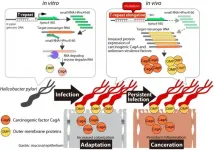Thawing permafrost cools Arctic currents: This might affect fish stocks
A new study by a University of Copenhagen researcher finds that thawing permafrost in Alaska causes colder water in smaller rivers and streams.
2021-04-12
(Press-News.org) GEOGRAFI A new study by a University of Copenhagen researcher finds that thawing permafrost in Alaska causes colder water in smaller rivers and streams. This surprising consequence of climate change could affect the survival of fish species in the Arctic's offshore waters.
Arctic stream
The study's researchers discovered that thawing permafrost causes groundwater to run deeper, where it becomes cooler than when it flows near the soil surface.
Rising global temperatures are causing frozen Arctic soil - permafrost - to thaw. In a new study, researchers have discovered something surprising: small rivers, creeks and streams that flow into larger lakes and coastal waters seem be to getting colder as permafrost melts. The phenomenon was previously documented in Russian rivers in the Arctic. But until now, no one had studied why the water was getting colder, even as air temperatures are warming and the permafrost is thawing.
Together with researchers from the US Geological Survey Alaska Science Center, Associate Professor Ylva Sjöberg of UCPH's Department of Geosciences and Natural Resource Management has shed new light on this cold water. The study's researchers discovered that thawing permafrost causes groundwater to run deeper, where it becomes cooler than when it flows near the soil surface.
"Permafrost is found just beneath the ground's surface. When permafrost is intact, groundwater flows from springs and the mountains and atop the permafrost layer, where it is significantly heated throughout summer. However, as permafrost disappears, runoff seeps deeper into the ground, where it cools before making its way into nearby streams, rivers and lakes," explains Ylva Sjöberg, the study's lead author.
Yet another climate change complication
In their study, the researchers studied the Noatak National Preserve in northwest Alaska. As with other Arctic areas, the Noatak is experiencing higher temperature due to climate change.
However, very little data is available for how climate change affects the temperature of smaller water flows. The researchers positioned 62 measuring sensors in different streams in areas both with and without permafrost. Here, they observed that water temperatures were warmer in permafrost-covered areas.
Using a computer model, the researchers were able to calculate that the summer water temperatures would average 11 degrees in areas of permafrost, while in areas without permafrost, it would be 4 degrees.
"We have no reason to believe that our observations in Alaska would be any different in other Arctic regions with analogous landscapes. This complicates the effects of climate change, as it seems that areas with permafrost are not subject to the same simple ratio of temperature increases in air and water as are used elsewhere," explains Ylva Sjöberg.
Could affect fish stocks
Salmon, grayling and sculpin are a few of the fish species that spawn and grow in these streams. Fish biologists from the U.S. Geological Survey (USGS) Alaska Science Center made initial observations of how cooler water temperatures might affect fish.
"Stream temperature ultimately determines a fish's ability to reproduce and survive. We suspect that colder water may limit how large a fish grows and likely limits whether they will thrive," explains Michael P. Carey, USGS fish biologist.
According to the biologists, who are now busy with analysing the study data, thawing permafrost can also introduce other factors that may disturb the aquatic environments of these fish.
"Streams draining from areas of thawing permafrost will likely show not only temperature fluctuations but also an increase in carbon and nutrient runoff," concludes Carey.
INFORMATION:
Study: https://agupubs.onlinelibrary.wiley.com/doi/10.1029/2020WR027463
ELSE PRESS RELEASES FROM THIS DATE:
2021-04-12
Tsukuba, Japan - Non-alcoholic fatty liver disease (NAFLD) is the most common liver disorder worldwide, affecting as much as a quarter of humanity. It is characterized by fat accumulation in liver cells and may progress to inflammation, cirrhosis and liver failure. Now, researchers at the University of Tsukuba reveal the positive effects, beyond the expected weight-loss benefit, of exercise on the liver.
NAFLD is associated with unhealthy behaviors such as overeating and a sedentary lifestyle. In Japan 41% of middle-aged men have NAFLD and 25% will progress to non-alcoholic steatohepatitis (NASH) and hepatic dysfunction.
Weight reduction is fundamental to NAFLD management. Unfortunately, ...
2021-04-12
Tsukuba, Japan--Liver disease, from metabolic and bacterial causes, is a growing concern. What connects these dots? The gut, or more specifically, bacteria in the gut. Bacteria that cause inflammation in the mouth are transported through the digestive tract to the gut and liver, where they can cause liver inflammation. Lipopolysaccharides, important structural molecules in some bacteria, act as endotoxins, producing systemic effects that can manifest as non-alcoholic fatty liver disease (NAFLD). Now, a multidisciplinary team from the University of Tsukuba show that exercise could be used to improve the oral environment in people with NAFLD, potentially leading to a new treatment for the disease.
These ...
2021-04-12
Osaka, Japan - Humans are exposed to many types of bacteria daily, the majority of which are harmless. However, some bacteria are pathogenic, which means they can cause disease. An extremely common pathogenic bacterial infection is Helicobacter pylori (H. pylori) in the stomach, where it can lead to chronic inflammation (gastritis), ulcers, and even cancer. A group of researchers from Osaka University have determined a specific molecular mechanism that H. pylori uses to adapt to growing in the human stomach for long periods of time.
In a report published in Nature Communications, this group found that a small RNA molecule called HPnc4160 plays a key role in how H. pylori invades the stomach ...
2021-04-12
Researchers at the University of Calgary and The Hospital for Sick Children (SickKids), in Toronto, have discovered genetic risk factors for OCD that could help pave the way for earlier diagnosis and improved treatment for children and youth.
"Our group made the first finding of a genome-wide significant risk gene relevant to childhood OCD," says Dr. Paul Arnold, MD, PhD, co-principal investigator, a professor and director of The Mathison Centre for Mental Health Research & Education at the Cumming School of Medicine. "We've known that OCD runs in families, but we hadn't identified and validated specific genetic risks of OCD symptoms in children and youth until now."
The research drew on ...
2021-04-12
Inserting lightweight optimization code in high-speed network devices has enabled a KAUST-led collaboration to increase the speed of machine learning on parallelized computing systems five-fold.
This "in-network aggregation" technology, developed with researchers and systems architects at Intel, Microsoft and the University of Washington, can provide dramatic speed improvements using readily available programmable network hardware.
The fundamental benefit of artificial intelligence (AI) that gives it so much power to "understand" and interact with the world is the machine-learning step, in which ...
2021-04-12
Study: "Which U.S. Elementary Schoolchildren Are More Likely to Be Frequently Bullied?"
Authors: Paul Morgan (Pennsylvania State University), Adrienne D. Woods (Pennsylvania State University), Yangyang Wang (Pennsylvania State University), George Farkas (University of California, Irvine), Yoonkyung Oh (University of Texas Health Science Center), Marianne Hillemeier (Pennsylvania State University), Cynthia Mitchell (Pennsylvania State University)
This study was presented at the AERA 2021 Virtual Annual Meeting
Session: Friends, Enemies, and Bullies: Peer Relationships in Schools
Date/Time: Saturday, April 10, 10:40 a.m. - 12:10 p.m. ET
Main Findings:
Kindergarten children who frequently externalize problem behaviors (i.e., are aggressive or ...
2021-04-12
PULLMAN, Wash. - Humans cannot live on protein alone - even for the ancient indigenous people of the Pacific Northwest where salmon was once thought to make up as much as 90% of their diet.
In a new paper led by Washington State University anthropologist Shannon Tushingham, researchers document the many dietary solutions ancient Pacific Coast people likely employed to avoid "salmon starvation," a toxic and potentially fatal condition brought on by eating too much lean protein.
"Salmon was a critical resource for thousands of years throughout the Pacific Rim, but there were a lot of foods that were important," said Tushingham the lead author of the paper published online on April 8 in the American Journal of Physical Anthropology. "Native people were ...
2021-04-12
Cranfield University research using data from smart meters has found that household water consumption changed significantly after the start of the COVID-19 lockdown, shifting from predominantly higher usage early in the morning to multiple peaks and continued demand throughout the day.
The study used machine learning algorithms to analyse and identify patterns in hourly water consumption data from 11,528 households in the East of England from January to May 2020.
The research is the first of its kind in the UK to quantify network consumption and segment households ...
2021-04-12
The CDC recently declared racism as a threat to public health. But when it comes to dismantling white supremacy in public health, action must be taken beyond issuing statements declaring racism a public health crisis, says Sirry Alang, associate professor of sociology and health, medicine, and society at Lehigh University. A new analysis from Alang and colleagues examines the three core functions of public health -- assessment, policy development and assurance -- and the ten recently revised essential public health services (EPHSs) to offer strategies public health can follow to dismantle white supremacy.
The article, "White Supremacy and the Core Functions of Public ...
2021-04-12
Older adults with more harmful than healthy bacteria in their gums are more likely to have evidence for amyloid beta--a key biomarker for Alzheimer's disease--in their cerebrospinal fluid (CSF), according to new research from NYU College of Dentistry and Weill Cornell Medicine. However, this imbalance in oral bacteria was not associated with another Alzheimer's biomarker called tau.
The study, published in the journal Alzheimer's & Dementia: Diagnosis, Assessment & Disease Monitoring, adds to the growing evidence of a connection between periodontal disease (gum disease) and Alzheimer's. Periodontal disease--which affects 70 percent of adults 65 and older, ...
LAST 30 PRESS RELEASES:
[Press-News.org] Thawing permafrost cools Arctic currents: This might affect fish stocks
A new study by a University of Copenhagen researcher finds that thawing permafrost in Alaska causes colder water in smaller rivers and streams.



